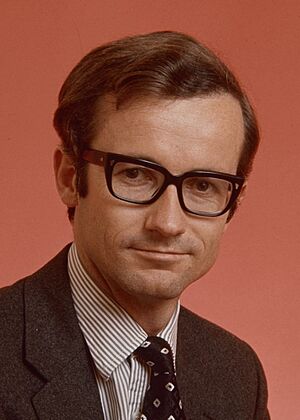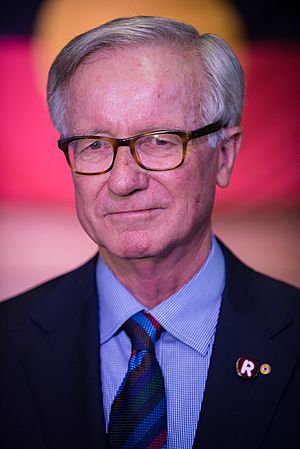Fred Chaney facts for kids
Quick facts for kids
Fred Chaney
|
|
|---|---|

Official portrait, 1974
|
|
| Deputy Leader of the Liberal Party | |
| In office 9 May 1989 – 3 April 1990 |
|
| Leader | Andrew Peacock |
| Preceded by | Andrew Peacock |
| Succeeded by | Peter Reith |
| Leader of the Opposition in the Senate | |
| In office 11 March 1983 – 27 February 1990 |
|
| Preceded by | John Button |
| Succeeded by | Robert Hill |
| Minister for Social Security | |
| In office 3 November 1980 – 11 March 1983 |
|
| Preceded by | Margaret Guilfoyle |
| Succeeded by | Don Grimes |
| Minister for Aboriginal Affairs | |
| In office 5 December 1978 – 3 November 1980 |
|
| Preceded by | Ian Viner |
| Succeeded by | Peter Baume |
| Minister for Administrative Services | |
| In office 25 August 1978 – 5 December 1978 |
|
| Preceded by | Peter Durack |
| Succeeded by | John McLeay |
| Member of the Australian Parliament for Pearce |
|
| In office 24 March 1990 – 8 February 1993 |
|
| Preceded by | New division |
| Succeeded by | Judi Moylan |
| Senator for Western Australia | |
| In office 18 May 1974 – 27 February 1990 |
|
| Preceded by | Syd Negus |
| Succeeded by | Ian Campbell |
| Personal details | |
| Born | 28 October 1941 Perth, Western Australia |
| Political party | Liberal (to 1995) |
| Spouse | Angela Clifton |
| Relations | Fred Chaney Sr. (father) Michael Chaney (brother) John Chaney (brother) Kate Chaney (niece) |
| Children | 3 |
| Alma mater | University of Western Australia |
Frederick Michael Chaney, also known as Fred Chaney, is an Australian former politician. He was born on October 28, 1941. He served as the deputy leader of the Liberal Party from 1989 to 1990. He was also a minister in the government led by Prime Minister Malcolm Fraser.
Fred Chaney was a Senator for Western Australia from 1974 to 1990. After that, he was a member of the House of Representatives from 1990 to 1993. Before becoming a politician, he worked as a lawyer. He studied at the University of Western Australia.
After leaving politics, Fred Chaney focused on helping Indigenous Australians. He worked with the National Native Title Tribunal and was a co-chair of Reconciliation Australia. He also helped start The Graham (Polly) Farmer Foundation.
Contents
Early Life and Education
Fred Chaney was born in Perth, Western Australia. His father, Sir Frederick Chaney, was also a minister in the Australian government. Fred has six brothers and sisters, including businessman Michael Chaney and judge John Chaney.
He went to school at Aquinas College, Perth. Later, he studied law at the University of Western Australia. In 1963, he became a lawyer in Western Australia. He also worked as a lawyer for two years in the Territory of Papua and New Guinea. In 1973, Fred Chaney helped create the Aboriginal Legal Service of Western Australia. This service provides legal help to Aboriginal people.
Political Career
Fred Chaney first tried to enter politics in 1971, running for a seat in the state parliament. He was elected to the federal parliament as a Senator for Western Australia in 1974. He was part of the Liberal Party.
Leadership Roles
From 1983 to 1990, Fred Chaney was the Leader of the Opposition in the Senate. This meant he was the main spokesperson for the Liberal Party in the Senate. In May 1989, he became the deputy leader of the Liberal Party. He held this role until April 1990.
In 1990, he moved from the Senate to the House of Representatives. He became the first member for the area called Division of Pearce. He stayed in this position until 1993.
Ministerial Positions
Fred Chaney held several important jobs as a minister in the government.
- From August to December 1978, he was the Minister for Administrative Services.
- From December 1978 to November 1980, he was the Minister for Aboriginal Affairs. In this role, he worked on issues affecting Indigenous Australians.
- From November 1980 until 1983, he was the Minister for Social Security. This role involved looking after welfare and support programs.
- He also helped other ministers with their work, including the Minister for Education and the Minister for National Development and Energy.
Life After Politics
After leaving politics in 1993, Fred Chaney continued his work in public service. In 1994, he joined the National Native Title Tribunal. This group helps resolve issues related to native title for Indigenous Australians. He became a full-time member in 1995 and a deputy president in 2000, retiring in 2007.
He was also the head of Murdoch University from 1995 to 2002. From 2000 to 2005, he was a co-chair of Reconciliation Australia. This organization works to build better relationships between Indigenous and non-Indigenous Australians. Fred Chaney left the Liberal Party in 1995. He felt that his work needed him to cooperate with people from all political backgrounds.
In January 2020, it was announced that Fred Chaney would be part of a group helping to design an Indigenous voice to government. This voice would allow Indigenous Australians to advise the government on policies and laws.
Views on the Liberal Party
In May 2022, Fred Chaney shared his thoughts on the Liberal Party. He believed the party had lost its way. He said that politicians were not always doing what voters wanted. He felt the party was too influenced by extreme views. He specifically mentioned the party's lack of action on climate change.
Fred Chaney encouraged people to vote for independent candidates who were more moderate. He supported his niece, Kate Chaney, who ran as an independent candidate in the 2022 federal election. Kate Chaney won her election.
Awards and Recognition
Fred Chaney has received several important awards for his work.
- In 1997, he was appointed an Officer of the Order of Australia (AO). This award recognized his service to the Australian Parliament and his contributions to the Aboriginal community. It specifically mentioned his help in setting up the Aboriginal Legal Service and his work with the National Native Title Tribunal.
- In 2003, Murdoch University gave him an honorary doctorate degree. This was for his work towards Aboriginal reconciliation and his time as the university's head.
- In 2017, the Australian National University also gave him an honorary doctorate. This was for his great contributions to public service and his lifelong dedication to Indigenous issues.
- On January 25, 2014, he was named the 2014 Senior Australian of the Year. This award celebrates Australians over 65 who have made significant contributions to the community.
See also
- Political families of Australia
 | James B. Knighten |
 | Azellia White |
 | Willa Brown |


